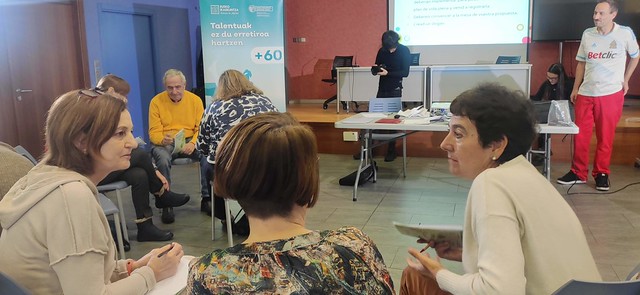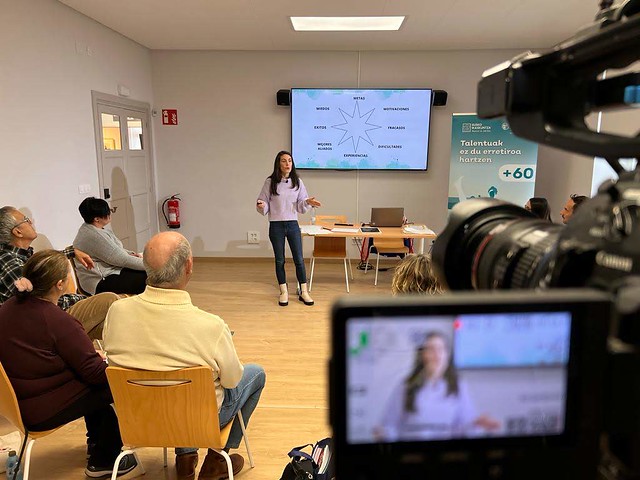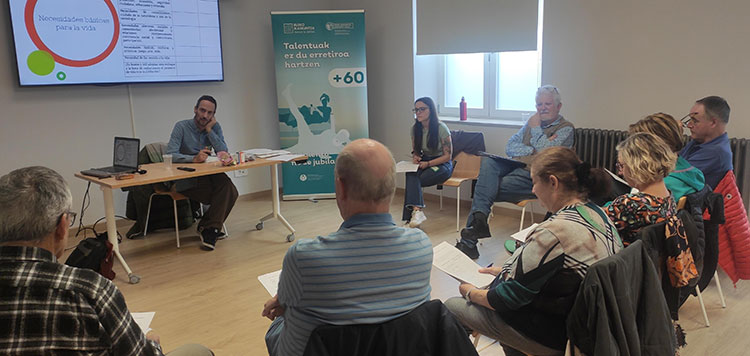During the month of November, Gernika and Gasteiz witnessed an initiative aimed at enhancing the talent of people of retirement age.
Under the motto "Talent does not retire", Eusko Ikaskuntza and the Vice-Minister of Social Services of the Basque Government organized a four-week program to train older people in their transition to the post-work period.
The program, called "60", focused on exploring the aging trend in a positive way, offering participants the opportunity to immerse themselves in inspiring experiences shared by specialized associations, such as Helduak Adi, Secot, Donostia 55 and Bizan. These organizations provided valuable perspectives on how to approach retirement with optimism, highlighting the opportunities for personal growth and social contributions that this stage of life can provide.
Guided by the GizarteLAB methodology, the participants in the four workshops in both locations designed a personalized model to lead a full life, identifying specific goals and objectives. The dynamics provided practical tools for planning personal projects, promoting autonomy and informed decision making.
Full life in old age: a challenge and an opportunity
Retirement is presented as a stage of change and adaptation, but also as a phase full of opportunities. The participants in the program have confirmed that retirement not only implies a cessation of work activity, but is also a period in which it is possible to continue growing both personally and professionally, as well as continue contributing significantly. to society.
As the main conclusion of the project, it highlights the suitability of providing specialized training in aspects linked to a full life during retirement. This group of older people not only expresses a growing interest in the acquisition of specific skills, but also reveals an express demand for training programs that are not only of high quality, but that are adjusted in an almost personalized way. to the individual circumstances of each participant. This emphasis on personalization underscores the importance of adapting educational content to the unique experiences, aspirations and challenges that each person faces in their transition to the post-employment stage. In this way, the relevance of designing and offering training programs that not only address general aspects, but also specifically address the particular needs and expectations of those embarking on this significant period of their lives, is highlighted.
In relation to the concept of a full life, a marked interest on the part of the participants has been identified; However, throughout the process, they have highlighted certain objective limitations in the working groups formed. These people have evidenced significant challenges in building the life they want due to the considerable care responsibilities they assume, whether in relation to their grandchildren or their own parents. These responsibilities have generated a tangible impact on the participants' ability to dedicate time and energy to the pursuit of their own goals and aspirations, revealing the complexity of balancing family demands with the pursuit of a full life in retirement. . This finding highlights the importance of addressing and finding practical solutions to reconcile caring responsibilities with the individual search for fulfillment in this life stage, recognizing the tensions inherent to these responsibilities and offering concrete strategies to overcome them.
Finally, it highlights the vital importance of social support as a fundamental element to face retirement in a positive way. Throughout their participation in the program, the groups have emphasized the importance of support coming from various areas, including family, friends, and specialized associations. They unanimously recognize that this support not only provides valuable emotional sustenance, but also plays a crucial role in building a satisfying and enriching retirement experience. The social support network not only provides emotional support during the transition to retirement, but also proves to be a valuable source of guidance and practical resources. Collaboration with family and friends allows retired people to share experiences, exchange advice and face the common challenges of this stage of life together. Additionally, connection with specialized associations offers access to specific services and programs designed to address the particular needs of those in this phase.
 |  | |
|---|---|---|
| Gasteiz | Gernika |



